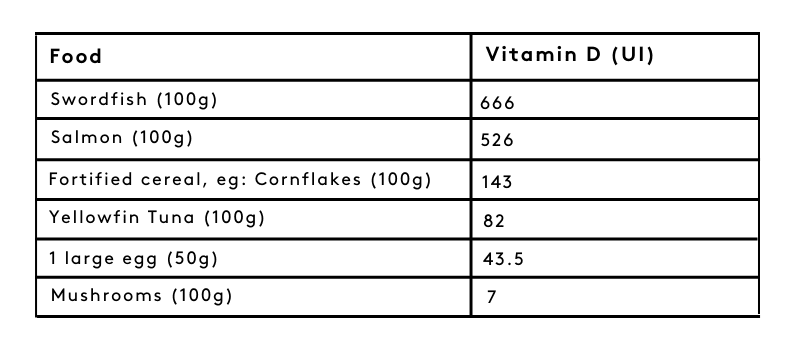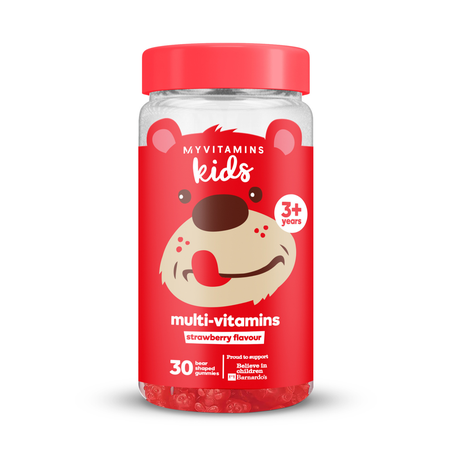
As an essential nutrient for bone health, immunity and calcium absorption, vitamin D should be part of our diet everyday. This vitamin is especially crucial for children, who without it, can't grow and develop properly.
- What Is Vitamin D?
- Where Is Vitamin D Found?
- Why Is Vitamin D So Important For Kids?
- How Much Vitamin D Should A Child Take?
- What Happens If A Child Doesn't Get Enough Vitamin D?
- What Other Vitamins Should My Child Supplement?
- Take Home Message
What Is Vitamin D?
Where Is Vitamin D Found?
According to the NHS, all children under the age of 5 should be taking a vitamin D supplement. In fact, between the ages of 1 and 10 can have up to 50 micrograms (2000 UI) of vitamin D per day. (2) To put that into perspective, the table below shows vitamin D levels in popular foods:

Why Is Vitamin D So Important For Kids?
Additionally, without enough vitamin D during pregnancy, your baby's bones and teeth can't develop properly.
How Much Vitamin D Should A Child Take?
It's also advised that children aged 5 and under should be given a daily supplement containing 10 micrograms of vitamin D, especially in the winter months. This creates a base level of the nutrient which can be topped up with foods or sunlight exposure. It's important to remember that vitamin D is essential for children and adults of all ages, so a supplement for children over 5 can be useful too.
What Happens If A Child Doesn't Get Enough Vitamin D?
Some people are at greater risk of vitamin D deficiency. These include those with naturally darker skin, people who stay indoors more often and those that are overweight or obese.
Signs of vitamin D deficiency in children include:
- Bone aches and pains
- Muscle cramps
- Delayed motor development
- Tiredness
- Low mood or depression
What Other Vitamins Should My Child Supplement?
Along with vitamin D, the NHS recommends that children under 5 also take supplements containing vitamins A and C. (2) Vitamin A is essential for eye health (3) and vitamin C plays a role in immune function, brain health and the condition of skin. (4) Although these two nutrients are more easily obtained from food, it can be difficult to ensure your child is eating a fully balanced diet every day.
Take Home Message

- Andıran, N., Çelik, N., Akca, H., & Doğan, G. (2012). Vitamin D deficiency in children and adolescents. Journal of clinical research in pediatric endocrinology, 4(1), 25.
- https://www.nhs.uk/conditions/vitamins-and-minerals/vitamin-d/
- Vitamin A contributes to the maintenance of normal vision.
- Vitamin C contributes to the maintenance of the immune system, psychological function and collagen formation in the skin.
- Ramos, M., & Stein, L. M. (2000). Development children’s eating behavior. J Pediatr (Rio J), 76(Supl 3), 229-37.
- Jackson, R. L., Hanna, F. M., & Flynn, M. A. (1962). Nutritional requirements of infants and children. Pediatric Clinics of North America, 9(4), 879-910.
- Nair, R., & Maseeh, A. (2012). Vitamin D: The “sunshine” vitamin. Journal of pharmacology & pharmacotherapeutics, 3(2), 118–126. https://doi.org/10.4103/0976-500X.95506
- Munns, C. F., Shaw, N., Kiely, M., Specker, B. L., Thacher, T. D., Ozono, K., … & Högler, W. (2016). Global consensus recommendations on prevention and management of nutritional rickets. Hormone research in paediatrics, 85(2), 83-106.
- Misra, M., Pacaud, D., Petryk, A., Collett-Solberg, P. F., & Kappy, M. (2008). Vitamin D deficiency in children and its management: review of current knowledge and recommendations. Pediatrics, 122(2), 398-417.





